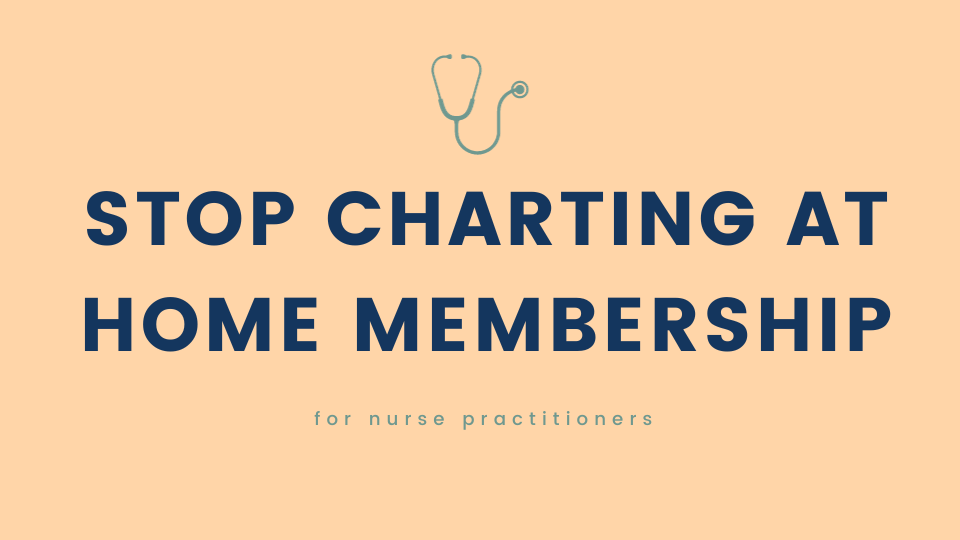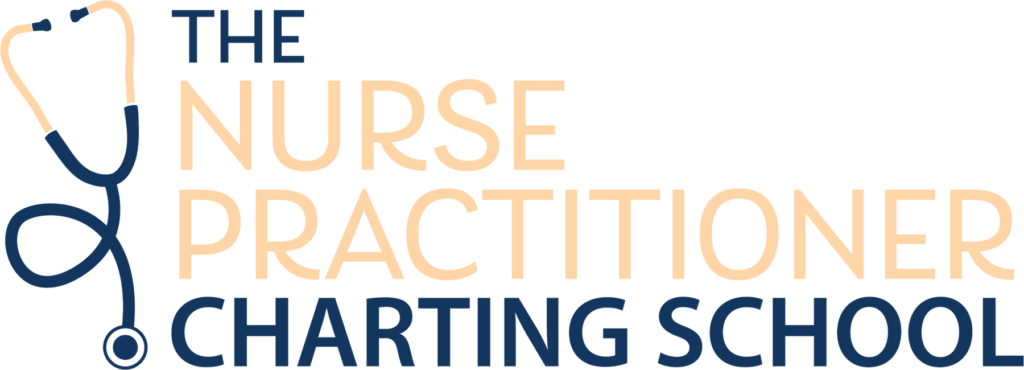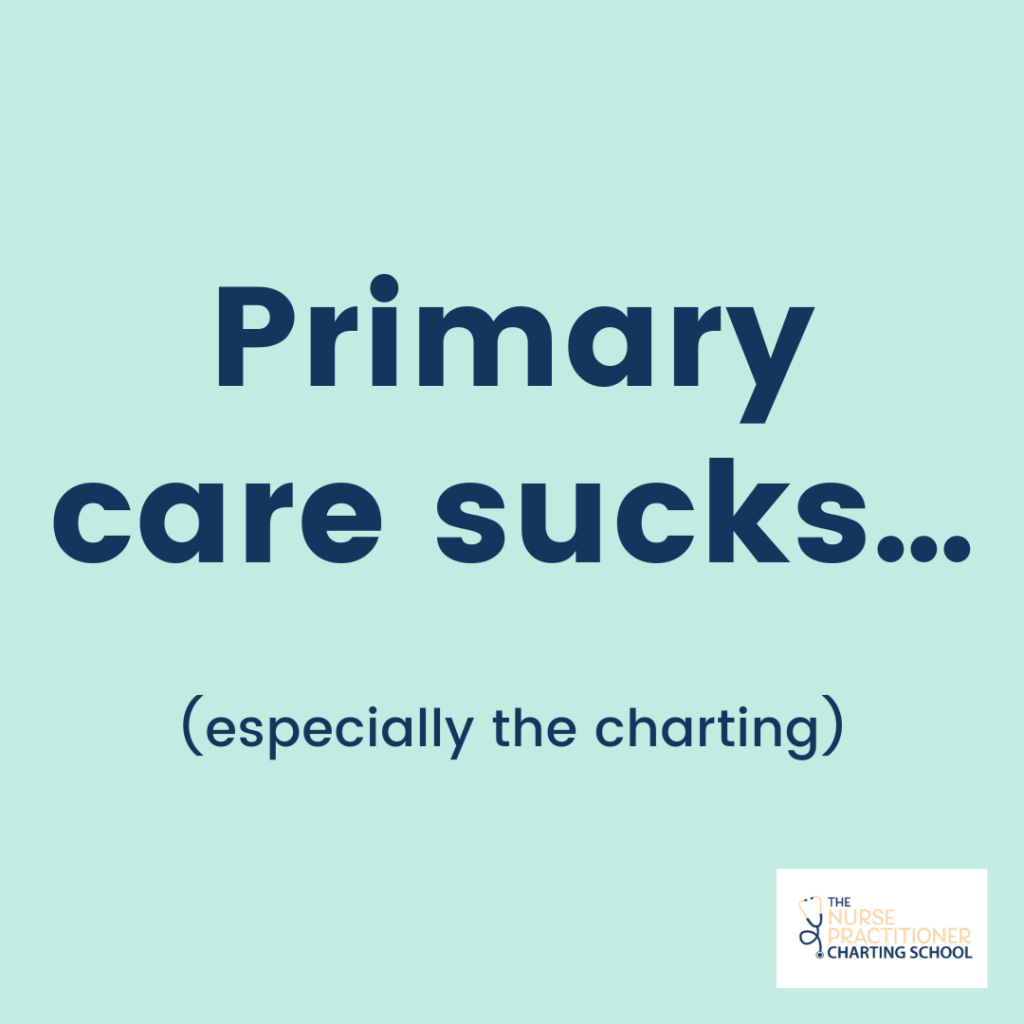As a primary care nurse practitioner, you are responsible for everything. You have to know a little about a lot of medical conditions. You have to be aware of hundreds of medication dosing, instructions, and interaction.
You have to see a high volume of patients and yet complete a thorough visit for those patients. Then add on the endless charting, med refills, analyzing diagnostic data, and never ending patient messages. There are so many challenges of being a primary care nurse practitioner.
Which is why the rate of burnout is so high as a primary care nurse practitioner. It is why so many nurse practitioners struggle with a lack of work-life balance. It is why so many nurse practitioners leave primary care to go to urgent care, specialty care, or leave healthcare all together.
Challenges for a primary care nurse practitioner
As the nurse practitioner charting coach, I work a lot with primary care nurse practitioners to improve their charting and time management. Let’s take a look at the challenges primary care nurse practitioners face.
Having to know a little about a lot.
Primary care is really the core of healthcare. Patients may need to see a specialist, be hospitalized, or have a certain procedure done, but they always come back to primary care. A primary care nurse practitioner has a lot of responsibility. They have to know a little about a lot of different health conditions. This makes it challenging and overwhelming.
High volume of patients.
The push in the modern healthcare system is to see more patients in a less amount of time. It feels like patients are being pushed through the clinic without having the time and attention patients deserve. So many primary care nurse practitioners are having to see patients and 15 minute intervals and sometimes even double booked.
This is very challenging with addressing the chronic conditions as this barely leaves enough time for the patient. It’s hard enough for the primary care nurse practitioner to complete the history of present illness during a 15 minute appointment let alone have time to educate patients about their chronic condition.
Having to address multiple complaints.
Because the primary care nurse practitioners have to know a little about a lot of different health conditions patients present with multiple issues how many times have you had a patient come in with a written list of 10 different questions to ask their primary care nurse practitioner.
While we are happy to help these patients, it is very challenging to address each issue in a 15 minute appointment. Since primary care nurse practitioners generally have the best relationship with a patient, they are trusted to address this multiple conditions.
Unable to order certain tests or medications.
I don’t know about you, but as a primary care nurse practitioner, I have had difficulty ordering certain tests or medications. The reasoning of the insurance company was that the order needed to come from a specialty provider.
While I absolutely appreciate specialty providers and send referrals when needed some time is it challenging for the patients to see that provider. I live in a rule area and most of the patients are low income. They have challenges of traveling an 1+ hours to see a specialty provider. Which is why I try and order certain test or medication’s when needed. This usually involves a prior authorization through the insurance company. Which is a whole different challenge of primary care nurse practitioners.
Hard time taking day off.
Many primary care nurse practitioners are already overwhelmed with the amount of work. A lot of providers find it challenging to take a day off, let alone several days off when they come back to work they are overwhelmed with seeing patients, catching up on med refills, and addressing the never ending patient messages. Often it is easier for the primary care nurse practitioner to NOT take a day off.
However, it is so important for providers to take it day off to allow time to rest and recharge. I always encourage nurse practitioners to complete self-care and take personal days when needed. But when primary care nurse practitioners know they will be more overwhelmed when they come back to work they are less likely to take a day off in the first place.
Lack of work-life balance.
Through my work as the Nurse Practitioner Charting Coach I have found that work-life balance is the number one cause of nurse practitioner burnout. And the number one cause of lack of work-life balance is charting! So many nurse practitioners are staying late at the office or bringing their charts home. Just trying to catch up. This creates a significant lack of work-life balance.
Primary care nurse practitioners are spending more time and energy on their work than they do on their personal lives. This can negatively impact their personal relationships with their children, spouses, friends, and family.
Keeping up with the EHR inbox.
One of the big concerns I hear from primary care nurse practitioners is the amount of “other tasks” they have to do. Not only do APRNs assess, diagnose, and treat patients, but they also have to document their findings. Then add on the tasks within the EHR (electronic health record) inbox: Medication refills, reviewing past medical documents, analyzing diagnostic data, and the never ending patient messages. There is not enough time in the day for primary care nurse practitioners to do all these tasks!
Primary care nurse practitioners seem to take a big hit because a lot of patients reach out to their primary care provider first before reaching out to a specialist. Keeping up with the EHR and box can be challenging for providers.
Never ending patient messages.
I think the patient message function within EHRs is a very helpful tool. However, it can be very time consuming for primary care nurse practitioners. Unfortunately a lot of patients abuse this form of communication with their PCP. A lot of patients will ask for a prescription for an acute issue instead of coming in for a clinic visit. Or many will ask for a refill of a routine medication without first scheduling an appointment.
Primary care nurse practitioners are expected to keep up with these messages, while also handling a full clinic load. It can be very time-consuming and frustrating. Which causes a lot of nurse practitioners to run behind during the workday, stay late at the office, and bring their charts home to catch up.
Short staffing, high turnover rate.
Many healthcare institutions are already short staffed and have a difficult time keeping staff. A lot of primary care nurse practitioners have to take on additional tasks. For example, completing prior authorizations, coordinating patient referrals, and calling patients with results. A lot of these tasks could be delegated to support staff such as a medical assistant, or nurse.
I have also seen instances where nurse practitioners are expected to room their own patients, obtaining vital signs and past medical history. It’s crazy APRNs are having to check in their own patients. And you would never see a physician rooming their own patients…
Strict health insurance guidelines.
Three words: Prior authorizations suck. Health insurance companies are cracking down on what they cover for patients. Many insurance plans are requiring prior authorizations for medications, diagnostic tests, procedures, and medical equipment. I once had to prior auth diabetic needles for a type 1 diabetic to inject their insulin. I mean how else were they supposed to administer the medication?
I have also had patients have a delay in care because we had to prior auth a CT scan. Now I am all for not ordering unnecessary tests, but it is frustrating that the health insurance companies are dictating the care of the patient. Not to mention the time and energy it takes for me and my support staff to complete the prior authorizations.
How to survive primary care
It is challenging to work as a primary care nurse practitioner. We have addressed many of the obstacles and frustrations with working in primary care. I know a lot of these issues are true for outpatient specialty providers as well.
I wish I could fix the modern healthcare system and eliminate all of these frustrations. But I can help primary care nurse practitioners implement the charting and time management tips that can help them to stay caught up during the workday and STOP charting at home.
And I put together a training just for primary care nurse practitioners!
This training will teach you the top charting and time management tips for primary care!
No more feeling overwhelmed with the amount of work to be done as a PCP.
No more constantly running behind and charting at home.
No more questioning if you should leave healthcare altogether.
In order to access this training, you can join the STOP Charting at Home Membership!


Erica D the NP is a family nurse practitioner and The Nurse Practitioner Charting Coach. Erica helps nurse practitioners STOP charting at home! Erica created The Nurse Practitioner Charting School to be the one stop for all documentation resources created specifically for nurse practitioners. Learn more at www.npchartingschool.com
Follow on Facebook: The Nurse Practitioner Charting SchoolAnd on Instagram: @npchartingschool
Free training: 4 charting tips to help nurse practitioners get their time back! Sign up here!



